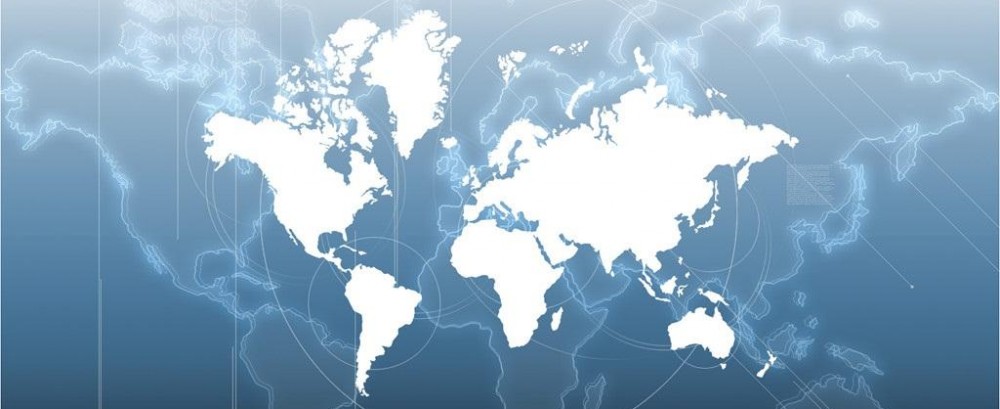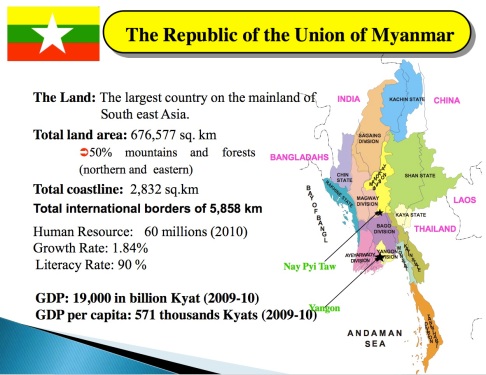“IT DOESN’T happen every day that a country of 60 million people in the most dynamic region of the world is suddenly open for business,” Hans Vriens (‘Big opportunities and big problems for firms in Myanmar’, 2012).
In May 2012, in response to Myanmar’s recent political reforms, the European Union, Australia and the U.S. announced they would suspend sanctions which barred foreign investment. The move follows calls from business and political figures in the United States, Europe and Asia. However, this has come with warnings by democracy icon Aung San Suu Kyi against excessive optimism over a political opening. This issue brief outlines the impact of removing the sanctions, and furthermore describes the opportunities and potential risks for Myanmar, the EU, U.S and the foreign investor.
Issue Overview
Since the 1990s, following the violent suppression of popular protests by Myanmar’s military rule, the U.S, EU and other western nations have maintained broad sanctions on the country. The May 2012 suspension of the sanctions by the U.S. EU and Australia represents a seismic shift in foreign policy towards Myanmar, and furthermore a significant business opportunity for western investors
Myanmar is rich in natural resources such as teak, minerals, oil and gas. For half a century it was one of the most prosperous countries in the region. Few of Myanmar’s citizens own cars and the shopping malls and supermarkets found throughout Asia are largely absent. These attributes of the country combine to represent a seemingly endless breadth of investment opportunity, from global mining and agricultural firms, financial institutions and manufacturing through to consumer goods and services.
While trade sanctions were in place, Myanmar’s main foreign investor has been China which prospered largely from investment/partnered procurement of oil, timber and other natural resources in the Shan state (North eastern state which borders with China). In response to recent democratic reforms and a desire to make the country more attractive for investment, the government is working to modernise foundational financial and economic systems – most timetabled for completion within the year – to improve both domestic and international economic services. In short, they’re demonstrating a commitment to making it easier for western enterprise to do business with them.
The removal of western sanctions opens the foreign investment floodgates to Myanmar which undoubtedly will have a significant impact. Ideally over time, the continued investment with good governance, will broadly benefit the population and in turn strengthen the Myanmar government’s embrace of democracy. However, the removal of sanctions is not without risk of reversal for the democratic process, as the influx of investment has the potential to provide a catalyst in strengthening the corrupt elements within the Myanmar’s society.
The key events leading to sanctions removal.
Myanmar came under military rule in 1962 and in 1988 the current junta was formed. In 1990 Aung San Suu Kyi’s National League for Democracy won the election, however the military threw out the results and maintained power. Following this election many of the National League for Democracy supporters, including their leader Aung San Suu Kyi were jailed. This was met with harsh criticism from the international community of democratic nations especially the U.S. and the EU. At this time most western nations sought to contain the rogue socialist state through adoption of extensive sanctions. In 2010 the iconic Aung San Suu Kyi’s was released from house arrest. The following year Thein Sein was elected president of Myanmar and in the 2012 elections Aung Sun Suu Kyi’s political won nearly every seat.
Since the election of Thein Sein to the presidency there’s been an internationally welcomed release of political prisoners, and his leadership has been broadly acknowledged as being central to the country’s democratic embrace.
Sanctions against Myanmar:
In 1997 the U.S. determined that the Government of Myanmar had committed large-scale repression of the democratic opposition in Myanmar and declared a national emergency with respect to the actions and policies of the Government of Myanmar. The EU and other western nations were also swift to condemn the government’s actions and to have also maintained similar sanctions since this time.
In May, 2012 the U.S, following the E.U and Australia, moved to remove sanctions. The EU announced that sanctions will be suspended for one year retaining only its embargo on arms sales. The U.S. announced that the varied and complex sanctions cannot be eliminated at a stroke – to circumvent they would do the next best thing, which was to suspend the enforcement of most of them.
The U.S & EU POV.
Obama stated that Burma had made important strides, but that the political opening is nascent, and America continues to have concerns, including remaining political prisoners, ongoing conflict, and serious human rights abuses in ethnic areas. The U.S has suspended sanctions conditionally – Although expressing optimism towards the political developments in Myanmar, the U.S. position is to cautiously roll back the sanctions with sensitivity towards encouraging the ‘right-type’ of investment. Senator John McCain stated that “The right kind of investment would strengthen Burma’s private sector, benefit its citizens and ultimately loosen the military control over the economy and the civilian government – the wrong investment would do the opposite, entrenching a new oligarchy and setting back Burma’s development for decades”.
In contrast the EU, ASEAN and Australia have moved to suspend all trade sanctions in line with Aung San Suu Kyi’s expectations and the considerable progress which the country has made in moving towards democracy.
The Burmese Government POV
After several decades of failed socialist planning, coupled with military crony capitalism, the once prosperous Mynamar has increasingly fallen behind its neighbouring countries. The recent developments, such as the freeing of political prisoners and open elections which elevated democracy icon Aung San Suu Kyi to government, all indicate to the international community a new found embrace of democracy and a new willingness to abide by international norms. This is evident through the Government’s commitment to reforms.
Myanmar officials have conceded that their economy was in no shape to prosper the planned entry into a single market among the ten-country association of South-East Asian Nations in 2015 and therefore needed to make significant structural reforms. The government now wants to reconnect the country to sources of international finance, especially the IMF and World Bank which it has been denied whilst under sanctions.
The government is encouraging specific western foreign investment in areas such as financial services, which is fundamental to improving access to other sectors within their economy. The Myanmar government is seeking this investment to accelerate development and growth of their economy, improve their international acceptability, that the arrival of respectable Western companies would bring and to dilute the growing influence of China .
The Investment Risks & Opportunities.
Myanmar is the largest nation among the ASEAN countries and shares borders with Thailand, Laos, Bangladesh and China. It connects to the western world through the natural waterway which is the Straits of Malacca. These attributes stress its geographically strategic location. Myanmar has a population of 60million people with a literacy rate of 94% and 60% of people speak English. Areas cited as key investment opportunities include the natural resources industry, financial services, Agriculture, Property development, Consumer Durables and Telecommunications.
Economy & the Financial Sector
Significant reforms are required to bring Myanmar’s banking and finance sector up to international standards. Myanmar’s overvalued exchange rate is undermining the national economy. Myanmar has a distinct lack of foreign banking experience, and currently most foreign currency transactions are completed manually. All combine to create challenges for both domestic and foreign investors.
Reforms
Although seeking to efficiently adopt and reform to facilitate broader foreign investment, Myanmar has several distinct challenges. There is weak co-ordination between government organisations and a scarcity of resources in the government sector with the skills to implement rapid changes required. Given the current level of maturity of many of the government institutions, pertinent industry information is still very difficult to access for potential investors. Additionally, much of the information made publicly available lacks credibility.
Economic
Myanmar’s economic fundamentals require significant reform and will be challenge for any foreign entity looking to establish business for some time. Firstly, the exchange rate is rigged – official exchange rate is 6000 yat to the U.S. dollar; the black market rate is around 800. It’s widely acknowledged the country lacks a proper banking system.
Also, although being a large market (60M), consumption of goods and services is low. The cost of living is high, and consumers are price sensitive. There are limited capital resources currently available for SME’s (Small Medium Enterprise’s) and inadequate support for domestic business to penetrate the overseas market.
Infrastructure
There exists a sizeable gap in the development of infrastructure between the rural and urban areas. The country doesn’t produce sufficient electricity and experiences shortages and dropouts regularly in isolated zoned areas. Due to the small user base for technology and information services, and the lack of competition in this sector, the cost remains high. Similarly, transportation costs are high and transportation systems unreliable. The German Delivery company DHL, has profited from the absence of a reliable postal service. If Myanmar is to join the broader Asian economic boom, they will need to invest significantly in fundamental infrastructure.
Legal System
“In the new spirit of openness, officials concede that corruption is endemic. That is putting it mildly: Transparency International, a watchdog, ranks Myanmar 180th out of 183 countries. Building a functioning legal system could take a long time”
There a two key pieces of legislation which are needed to transform the country to a viable destination for foreign enterprise. Firstly, the new foreign investment law, which will set out the parameters for whether investors can buy land and invest in banks, telecommunication companies etc. Secondly, the foreign exchange law which Myanmar’s government is consulting with the IMF and World Bank, aims to unify the country’s chaotic exchange rate. This financial reform would enable foreign investors to remit money electronically at the proper market rate – and therefore do business legitimately
Conclusion
The impact of removing sanctions on Myanmar will stimulate foreign investment activity. It will be important for western governments to monitor the situation carefully and be willing to adjust their current approach to sanctions if necessary to support Myanmar’s continued trajectory towards a democratic embrace, and support the necessary foundational development to strengthen economic integration with the international community.
Twitter : @richmondjwx
References
Boehler.P (2012) ‘Irrawaddy: Drugs kingpin extradited for Mekong murders’ [online] Accessed from 5/12 from: http://www.irrawaddy.org/archives/3992
Boehler.P (2012) ‘Chinese Drug Busts Shed Light on Burma’s Burgeoning Trade’ [online]
Accessed from 5/12 from : http://www.burmanet.org/news/2012/04/16/irrawaddy-chinese-drug-busts-shed-light-on-burma%e2%80%99s-burgeoning-trade-%e2%80%93-patrick-boehler/
‘Big opportunities and big problems for firms in Myanmar’ The Economist (2012) Accessed 5/12 from: http://www.economist.com/node/21548990
‘Burma’s exchange rate, from 6 to 800 kiat for one dollar’ Thailand Business News (2012), accessed 5/12 from: http://thailand-business-news.com/burma/36947-burmas-exchange-rate-from-6-to-800-kiat-for-one-dollar
‘Big opportunities and big problems for firms in Myanmar’ (2012) The Economist [online]
Accessed from 5/12 from: http://www.economist.com/node/21548990
‘Burma’s Business Revolution’ (2012) The diplomat [online]
Accessed from 5/12 from: http://the-diplomat.com/2012/01/25/burma%E2%80%99s-business-revolution/?utm_source=feedburner&utm_medium=feed&utm_campaign=Feed%3A+the-diplomat+%28The+Diplomat+RSS%29
Corben.R (2012) ‘Burmese political reforms raise hope for curbing opium production’[online]
Accessed from 5/12 from : http://www.voanews.com/content/burmese-political-reforms-raise-hope-for-curbing-opium-production-137659753/150850.html
‘Drug Surge Clouds Myanmar Reform Effort’ (2012) New York Times
Accessed from 5/12 from: http://www.nytimes.com/2012/05/14/world/asia/drug-surge-clouds-myanmar-reform-effort.html?pagewanted=all
‘Myanmar’ New York Times, New York Times (2012) [online]
Accessed 5/12 from : http://topics.nytimes.com/top/news/international/countriesandterritories/myanmar/index.html
‘Myanmar’s army and the economy’ The economist [online]
Accessed from 5/12 from: http://www.economist.com/node/21553091
Naing. S (2012) ‘Irrawaddy: Burmese drug kingpin transferred to China: Report’ [online]
Accessed from 5/12 from : http://www.mizzima.com/news/regional/7091-burmese-drug-outlaw-transferred-to-china.html
Paletino 2012 ‘Disappointing ASEAN’ The Diplomat.[online]
Accessed from : http://the-diplomat.com/asean-beat/2012/03/20/disappointing-asean/
Quin & Eckert (2012) ‘ U.S. suspends sanctions on investment in Myanmar’
Accessed 5/12 from : http://in.reuters.com/article/2012/05/17/usa-myanmar-clinton-idINDEE84G0I620120517
Robinson (2012) ‘A businessman’s guide to Myanamr, British-style’ [online]
Accessed from 5/12 from: http://blogs.ft.com/beyond-brics/2012/05/15/a-businessmans-guide-to-myanmar/#axzz1v0d9S16q
Ramesh.S (2012) ‘EAN supports lifting of sanctions against Myanmar’ [online]
‘Myanmar’s startling changes’ (2012) The economist [online]
Accessed from 5/12 from: http://www.economist.com/node/21547261
UNICEF ‘Myanmar, Republic of the Union of’ 2012 Accessed from 5/12 from:
http://www.unicef.org/infobycountry/myanmar_statistics.html
‘U.S. says “eyes wide open” in response to Myanmar changes’ Reuters (2012), .[online]
Accessed from : http://www.reuters.com/article/2012/05/11/us-usa-myanmar-official-idUSBRE84A1CF20120511

